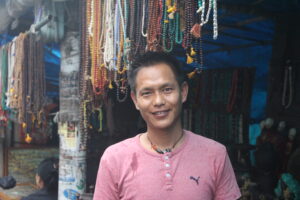
Photo: Kirsty McHenry / Contact
Lhakpa Tsering stands outside his antiques stall on Temple Road, a wide smile on his face for everyone who comes past. He is a devoted Buddhist, but this has not always been the case. He has come through many trials to reach this point in his life.
He was born in Dharamshala of Tibetan parents and went to an Indian government school. He was not interested in learning. Early on he got into a fight with an older boy and won. After that he developed a bad reputation: fighting, smoking, drinking alcohol, doing drugs and having many girls. He did not complete his board exams after a dispute with the principal of the school.
He got a job in construction making 50 Rupees per day, but he left that after 6 weeks. A friend suggested that he join the army. He enjoyed target shooting. He was bad at first, but with training became very good. He also took part in boxing and reached the finals of a boxing tournament.
He became a paratrooper. He enjoyed the jumps. “In the last moments before the jump there’s a time of hectic activity. This all changes after the jump. No noise, no hurry, relaxed. You feel like a free man,” he muses.
He found that it was hard to be a Buddhist in the army. One day he was ordered to kill a sheep, but he just could not do it no matter how hard he tried. Eventually he went back to his officer and asked that someone else be given the job.
After two years he did the parachute instructor’s course. This was tough: each day they had to do 300 push-ups, 600 sit-ups and 24 pull-ups. In addition they had to run at least 25 kilometres.
As an instructor he had a very responsible job ensuring that recruits did everything just right. Any mistake might cost a life. A student died on his second jump when his parachute did not open. This had a huge effect on Lhakpa Tsering.
Later he was on patrol when his squad was ambushed by a group of terrorists. They were fortunate that the enemy fired too soon. In the fire fight that followed three terrorists were killed as well as his “body pair”, his closest companion. At the time he did not feel anything except the desire to escape and kill the enemy. “Afterward I felt a vibration inside. I felt scared and very excited.” The incident still haunts him to this day.
He then had a period of being a computer clerk. There were few soldiers who had expertise in computers in 2002, and he was posted to Head Quarters. This was a time of ease. There was none of the challenging physical training he had faced in his earlier army placements and he had a relaxed time of working in offices. “For four years I lived like a king,” he fondly recalls.
He applied for a discharge from the army, and with the help of his Commanding Officer he was granted discharge in record time.
For two years he lived the bachelor’s life, partying with friends. At the end of that time he was out of money. On a visit to Dharamshala he was struck by the demand for antiques. He joined his brother in Goa and worked in his shop. He found that he had a natural flair for the business.
This was a turning point in his life. In order to become skilled in antiques he read about Buddhist philosophy and studied His Holiness’s teachings. A change came into his life. Where he used to be aggressive, he came to realise that compassion and love are much better. The teachings make it easier to control the situation. “If you have love and compassion, you’re a Buddhist,” he says.
In 2013 he moved to Dharamshala and set up his own stall. He got married and he and his wife have a daughter who will be turning three in a few weeks.
He has seen much, and it has changed him. “Stay away from drugs and alcohol,” he advises sadly. “They killed many of my friends.”
For the future he sees only a settled life, improving his stall and caring for his family. And with that he is content.




 Print
Print Email
Email













